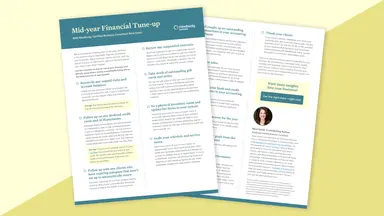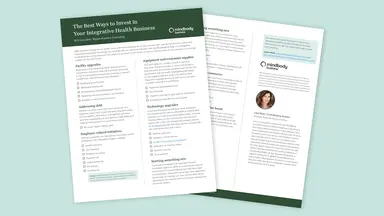
How Do I Budget For My New Business?
Look at you, newbie entrepreneur—you’ve taken that fabled leap into the Land of Doing Your Own Thing. The hard part is over! Or so they say—and by “they,” I mean motivational Instagram quotes.
But once the dust settles and you finally find yourself alone with your business idea, you run into an issue: setting up the financial side of your new business freaks you out. For starters, how do you even start budgeting for a business?
Enter, me: Berna Anat of HeyBerna, online creator, entrepreneur, and financial hype woman. I taught myself how to set up my business finances, and now I’m passing the baton. Below are my three tips to set up the financial basics of your new business so you don’t go broke before hitting a profit.
1. Get your accounts in formation
You should start off with at least four different business banking accounts that are totally separate from your personal accounts:
The Landing Strip: A checking account that serves as a first-stop for your money. Any income from your business, gifts, or random deposits will hit this account first.
Operating Expenses, or OpEx: A checking account that holds the money to pay for everything you need to run your business month-to-month, like website hosting, supplies to create your product or rent for your store.
Oh Snap Savings: A savings account that holds your business emergency fund. If you have a low-income month, or “stuff” hits the fan, you should be able to pay for at least six months of Operating Expenses without digging into your personal pockets.
Uncle Sam Savings: A savings account for—you guessed it—taxes. Here’s where you should contact a Certified Public Accountant (or CPA) to ask what percentage of every dollar or paycheck you should be saving for taxes. You’ll keep that money here so that when tax time rolls around, you’re ready.
2. Stack and track that cash
There are three essential money questions you should ask yourself before opening your business doors:
What are my start-up costs?
What’s in my monthly business budget?
How will I pay myself?
Start-up costs
The simple way to calculate start-up costs: (Your Assets) + (6 months of Operating Expenses) + (6 months of Emergency Savings) = Your Start-Up Costs.
Your assets are the raw, often permanent materials needed at the beginning of a business. If you’re opening a yoga studio, for example, your assets might be a studio space, a computer for the front desk, or yoga props like mats and blocks.
Six months each of expenses and savings is a safe number, but ultimately, it’s up to you: How much padding do you need to confidently start your business? Back-up cash gives you panic-free time to run your new business while experimenting and figuring out how your money flows.
Monthly business budget
Your budget is more than those recurring operating expenses. It might also include essential items that aren’t necessarily bills.
For example, it might include financial goals, like the money you’re putting away each month to save up for a piece of fitness, salon, or spa equipment, or money you’ll spend on marketing and promotional materials. It might even include what I call a Learning Allowance—a certain amount I put away each month to buy myself a business-related book, course, or other level-up material.
It can be up to you, or an excellent bookkeeping service like Bench, to keep up with what’s on your monthly business budget. (More on this in a bit!)
Paying yourself
Here’s where we ask ourselves: how many dollars do you need to run your regular life? And at what point in your business will you be paying yourself those dollars?
Most business owners pay themselves from their profits, which is commonly called the Draw Method. This means that when your business earns money, you pay your business expenses, you put away for taxes, and whatever is left over? That’s the paycheck you withdraw for yourself, which can vary according to what you’ve earned.
Alternatively, you might use the Salary Method, which means you regularly get a set paycheck as if you’re your own employee.
Whether you’re running a side-hustle or a full-time scheme, figuring this out—while feeling confidently supported by your business emergency savings—is key.
3. Set up money-care systems
Take it from every bookkeeper and accountant ever: running the financials of even a small business is a full-time job. Thankfully, the internet has met us halfway with a ton of online bookkeeping services that do this work for you.
I personally love Bench—it’s a powerful online tool to help entrepreneurs understand their expenses, make informed decisions with financial insight, and monitor cash flow with their Pulse feature.
You can decide what bookkeeping features are essential to your business, but one of my must-haves is access to a real human bookkeeper I can chat with anytime, which is included in all of Bench’s monthly plans.
In addition to a bookkeeping tool, you’ll need a recurring money maintenance time on your calendar. I schedule one hour every other Monday to open up my bank accounts, check-in with my bookkeeper, and review my financial goals for the month. Knowing I have set money-care times every month keeps my daily financial anxieties at bay.
Give yourself one month or more to reach these financial milestones before making any major business moves. Your future financial self with thank you for it.



